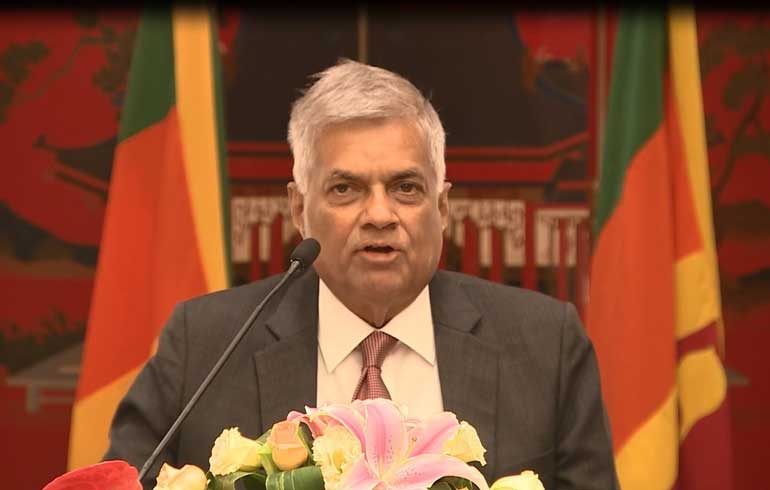Tuesday Feb 24, 2026
Tuesday Feb 24, 2026
Monday, 11 April 2016 00:00 - - {{hitsCtrl.values.hits}}

Prime Minister Ranil Wickremesinghe addresses reporters at a hotel in Beijing, China April 9
Hambantota port, airport to be run by SL-China JVs, Port City JV to be listed on Colombo stock market
Sri Lanka has asked China to swap some of the $8 billion it owes Beijing for equity in infrastructure projects and offered to sell stakes in its companies to Chinese ones, Colombo officials said on Saturday.
The ouster of President Mahinda Rajapaksa, who steered Sri Lanka toward China until his 2015 election defeat, was a setback for relations as his successor has reviewed projects to check if they were fair and legal.
Now President Maithripala Sirisena’s government, faced with falling foreign reserves, a balance of payments crunch and few, if any, alternative investors, is heading back into China’s embrace, albeit asking for better terms.
Speaking to reporters in Beijing, Sri Lankan Prime Minister Ranil Wickremesinghe said his indebted country was suffering because of global economic uncertainty.
“We’ve been talking with some companies and also the government of China about the possibility of some infrastructure projects becoming public-private partnerships, in which part of the debt will become equity held by the Chinese companies,” he said. Among projects are the Hambantota airport and the seaport. Prime Minister also said that 1000 acres have been leased to Chinese businessmen in a 99 years lease agreement to establish a new industrial zone in Hambantota.
International trade minister Malik Samarawickrama said Sri Lanka would also like additional funds from China, though they had not asked for a specific amount.
“We want to reduce the current debt by inviting Chinese companies, Chinese investors, to look at some of the enterprises in Sri Lanka, the state-owned enterprises, with a view to taking at least part of that equity over,” he said.
“Then we can reduce the current debt that we have and open up the opportunity for us to take more funds from Chinese banks.”
Sri Lanka upset China when it ordered a review of a $1.4 billion Colombo port city project last year, citing irregularities in the awarding of the contract to state-owned China Communications Construction Company (CCCC) by the previous government.
Last month, the present government, grappling with a difficult economy, ordered the Chinese firm to resume work on the project, the country’s biggest foreign investment project, that includes apartments, shopping malls and marinas.
But CCCC, which had estimated that the shutdown would result in losses of more than $380,000 a day, has sought compensation of $125 million, according to Sri Lanka, which has said it can’t pay and wants to negotiate.
“The company has asked for additional compensation in view of the fact they say there has been a delay,” Wickremesinghe said. “But I think we can talk and settle it.”
Prime Minister said Port City is not going to be a Sri Lanka- China venture. “It is going to be open to everyone. Already some of the Indian businesses have told me they are interested in coming in to port city. It will be a joint venture, there will be the Chinese companies and Sri Lankan companies, and we want to put 40% out into the Stock market because we intend to give Indian companies the opportunity for to invest in this Sri Lankan venture,” Wickremesinghe said.
He said in addition to China and Sri Lanka the Singaporeans and many Indians have also shown interest. “I will be going to India, Bangladesh, Middle East, East Africa, South East Asia and ask everyone to join in including Japan and China. We want to make this an Asian area. Where Asians can deal in the Indian Ocean and even go to the European Union. So I have no doubt with the discussion with the Indian businessman that they would welcome it. And many of them are free to have property in the port city,” the Prime Minister said. “It’s an opportunity for everyone to make money. That’s what we do in Asia,” he added. (Agencies, Reuters and AFP)